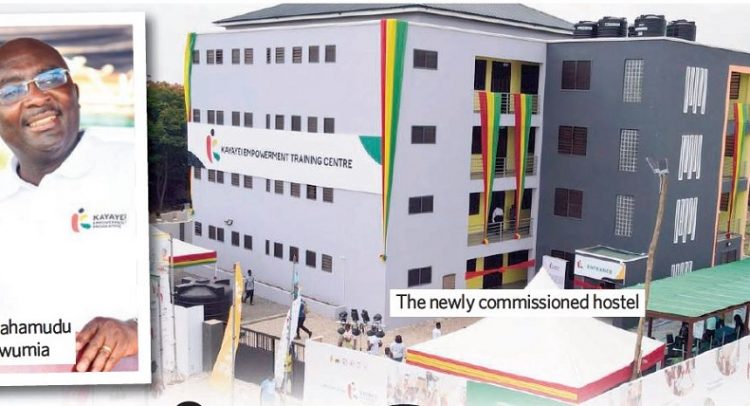Dr. Mahamudu Bawumia
Vice President Dr. Mahamudu Bawumia yesterday outdoored a programme that seeks to give employable skills to the growing number of head porters also known as ‘kayayei’ in the country.
Dubbed the ‘Kayayei Empowerment Programme (KEP)’, it is intended to equip the head porters with skills in soap making, bead making, baking, makeup and others.
The government has therefore constructed two Kayayei Empowerment Training Centres at Madina and Ashaiman, all in Accra, where beneficiaries will be given three weeks intensive skills training with a GH¢1,000 stipend for the period of training.
It fulfils a promise made by Dr. Bawumia, on behalf of government in 2019, to head porters, during a visit to their base in Agbogbloshie, to get them decent place of accommodation, in a bid to help move them out of the streets.
The programme is being undertaken together with Ghana Enterprises Agency (GEA), National Entrepreneurship and Innovation Programme (NEIP), Youth Employment Agency (YEA), Council for Technical and Vocational Education and Training (CTVET), Ghana Education Trust Fund (GETFund), District Assemblies Common Fund (DACF), the Father Campbell Foundation, and Ghana National Gas Company and Bulk Oil Storage and Transportation Company Limited (BOST).
It was an interesting sight to behold when Vice President Bawumia arrived at the venue for the programme at Madina yesterday. Even before Dr. Bawumia, who is also the presidential candidate of the ruling New Patriotic Party (NPP), arrived at the place, lots of the migrant female head porters had thronged the venue amidst drumming and dancing.
The entire place went agog when the Vice President finally arrived, as they besieged his vehicle. Dr. Bawumia and his security detail had a difficult time meandering their way through the thick crowd to the dais where he was welcomed with loud cheers.
Dr. Bawumia said the Kayayei Empowerment Programme “is a cause close to my heart as it addresses the plight of a marginalised segment of our society.”
“This noble endeavour resonates profoundly with the core values of our mission, as it squarely addresses the pressing needs of a marginalised segment of our society that has long been relegated to the shadows of neglect and indifference,” he noted.
That, he said, was because “we have over 100,000 head porters in Ghana who endure unimaginable hardships such as lack of shelter, inadequate medical care, and harassment in urban centres on a daily basis.”
“From the harsh realities of homelessness to the glaring deficiencies in access to adequate healthcare and the pervasive scourge of urban harassment, their plight stands as a stark testament to the moral imperative of urgent intervention to uplift and transform their lives,” he said.
This multi-faceted programme is characterised by a rigorous and exhaustive recruitment process, culminating in the selection of initial training cohorts comprising 5,000 head porters.
Over the span of three weeks, participants will be immersed in a transformative learning experience, encompassing essential modules such as baking and beading, supplemented by invaluable soft skills training in personal healthcare, financial management, and entrepreneurial acumen.
The provision of post-training support and implementation of a track and trace model, serves as the linchpin of the programme’s efficacy, with participants receiving starter packs tailored to facilitate their seamless integration into new economic opportunities, to further ensure that beneficiaries do not return to being head porters.
The programme’s infrastructure boasts the establishment of two hostels (other hostels are under construction in Ashanti and Bono East regions) each meticulously designed to accommodate and cater to the needs of 300 girls.
The hostels are equipped with modern training facilities, sanitary washrooms, and bathing areas, these hostels exemplify unwavering commitment to safeguarding the dignity and well-being of all participants.
With an overarching goal to empower kayayei across Ghana through the transformative power of Technical and Vocational Education and Training (TVET), the programme sets out to train a total of 5,000 girls this year (both residential and non-residential).
In addition to the strides already made, Dr. Bawumia dropped the hint that discussions are ongoing with Metro Mass and Ayalolo to give them driving and ICT training.
“These partnerships will further expand the horizons of the Kayayie Empowerment Programme, offering even more avenues for skills development and economic empowerment,” he said.
By Charles Takyi-Boadu, Presidential Correspondent

